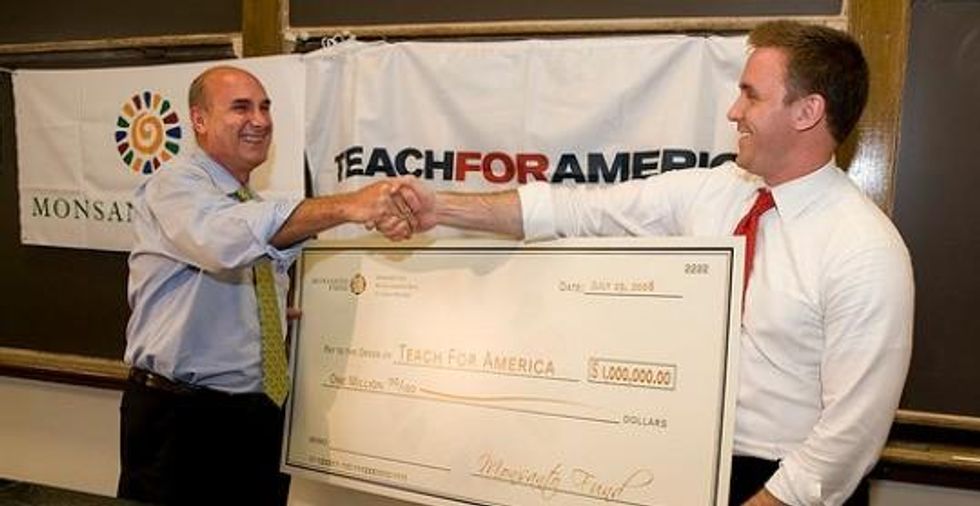"The Walton Family Foundation's support for Teach for America is driven by the organization's proven ability to create a pipeline of outstanding education reform leaders," said Ed Kirby, deputy director of the Walton Family Foundation's K-12 Education Reform effort, in a statement released last week.
"The foundation is expanding its investment in Teach For America because of the organization's ability to produce leaders who are helping to transform public education in the US," the statement continues.
Recruiting recent college graduates from many of the nation's most prestigious universities, the organization requires a two-year commitment from its student-teachers. Though the majority of recruits have no education degree or experience, the nonprofit boasts an "intensive" five weeks of training before dropping these fledgling educators in the nation's neediest urban and rural schools.
Touting such alumni as StudentsFirst founder and former Chancellor of Washington, D.C. public schools Michelle Rhee, LAUSD Board member Steve Zimmer, and KIPP charter school founders Mike Feinberg and Dave Levin, TFA prides itself on introducing individuals to the policy side of the public education debate.
As the Washington Post's education columnist Valerie Strauss explains, "TFA is not looking for young people who want to be teachers, but rather, people it believes will have 'important' jobs later in life who can advocate for public education. That's why TFA recruits are asked to give only a two-year commitment to teaching."
"TFA is a self-perpetuating organization," addsJacobin writer Kenzo Shibata. "Teach for two years, burn out, go to law school, become a policy maker, make policies that expand TFA."
In a Los Angeles Times article published Saturday, reporter Howard Blume notes the high correlation between the number of TFA hires in states such as California, Alabama, North Carolina, and Louisiana, and the dominance of efforts to embrace charter school expansion, limiting the protections on veteran teachers and teachers' unions.
In Chicago--where the school board recently voted to shutter 49 of the city's public schools eliminating jobs for over a thousand teachers--the Board of Education voted to increase its payment to TFA from $600,000 to nearly $1.6 million, and to add up to 325 new TFA recruits to Chicago Public School classrooms, in addition to 270 second year "teacher interns," the Chicago Sun Times reports.
"While TFA uses the rhetoric of justice and equity, these reforms in fact stifle democratic processes and are used to justify budget cuts and the takeover of public institutions by privately funded and privately run companies." -Valerie Strauss
After Hurricane Katrina, when Louisiana state officials laid off more than 7,000 employees and took over 102 of 117 city schools converting them to nonunion charters, Teach for America provided a large share of the replacements.
"I don't think this could have happened without TFA," boasted Georgia State University assistant professor Kristen Buras. "You need these on-the-ground organizations that are going to assist the state with these reforms."
This year, approximately 375 New Orleans teachers are members of TFA, up from 85 just a few years ago.
"While TFA uses the rhetoric of justice and equity, these reforms in fact stifle democratic processes and are used to justify budget cuts and the takeover of public institutions by privately funded and privately run companies," added Strauss.
For just one example, this video from the organization's own website, where TFA alumnus turned Colorado State Senator Michael Johnston employs the language of the civil rights era to justify passage of Colorado's high-stakes teacher accountability law: Though the chorus of criticisms against the organization has grown, it was not until last month that the first coordinated effort to "put the breaks" on TFA took place when roughly one hundred students, parents, academics and teachers, some affiliated and others not with the organization, gathered in Chicago for a symposium entitled, "Organizing Resistance to Teach for America and its Role in Privatization."
"The desire to make the world a better place is something that Teach for America taps into," said TFA alumna Terrenda White, a graduate student at Teachers College, Columbia University.
"When did my willingness to teach in urban communities become translated to this very specific political agenda? It's not what I believe in."



